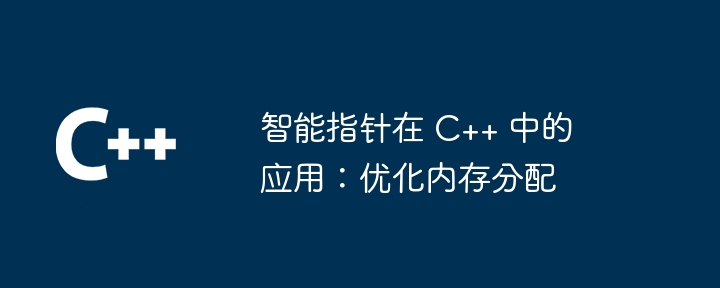
Smart pointers simplify memory management in C, eliminating memory errors by automatically managing object memory. Several smart pointer types include: std::unique_ptr: Ensures unique ownership of an object. std::shared_ptr: allows multiple owners to point to the object at the same time. std::weak_ptr: Weak reference, does not increase the reference count of the object. Using smart pointers, such as std::unique_ptr, can automatically allocate and release memory, improving program safety, readability, and memory management efficiency.

Application of smart pointers in C: Optimizing memory allocation
Introduction
In C, managing memory is a tedious and error-prone task. Smart pointers are an effective and modern way to help us avoid memory management errors, thereby improving the robustness and readability of our code.
What is a smart pointer
A smart pointer is an object that encapsulates a raw pointer. It can automatically manage the object's memory, from creating the object to destroying the object. This means that developers do not need to manually manage the declaration and release of pointers, smart pointers will automatically complete this process for us.
Types of smart pointers
There are several types of smart pointers in C, including:
std::unique_ptr : Ensures sole ownership of a pointer to an object. std::shared_ptr: Allows multiple owners to point to an object at the same time. std::weak_ptr: A weak reference that does not increase the reference count of the object. Practical case
To demonstrate the practical application of smart pointers, let us create a class that manages string objects:
class MyClass {
public:
MyClass(const std::string& str) : _str(new std::string(str)) {}
~MyClass() { delete _str; }
std::string& get() { return *_str; }
private:
std::unique_ptr<std::string> _str; // 使用 std::unique_ptr 智能指针
};In In this example, _str is a std::unique_ptr smart pointer pointing to a std::string object. When MyClass is constructed, the smart pointer automatically allocates memory for _str and initializes a new std::string object. When MyClass is destroyed, the smart pointer will automatically release the memory occupied by _str.
Benefits
Using smart pointers has the following benefits:
Using smart pointers in C can significantly improve the memory management efficiency and program robustness of the project.
The above is the detailed content of Application of smart pointers in C++: Optimizing memory allocation. For more information, please follow other related articles on the PHP Chinese website!
 What are the differences between c++ and c language
What are the differences between c++ and c language
 Recommended learning order for c++ and python
Recommended learning order for c++ and python
 Cost-effectiveness analysis of learning python and c++
Cost-effectiveness analysis of learning python and c++
 Is c language the same as c++?
Is c language the same as c++?
 Which is better to learn first, c language or c++?
Which is better to learn first, c language or c++?
 The difference and connection between c language and c++
The difference and connection between c language and c++
 C++ software Chinese change tutorial
C++ software Chinese change tutorial
 Cost-effectiveness analysis of learning python, java and c++
Cost-effectiveness analysis of learning python, java and c++




